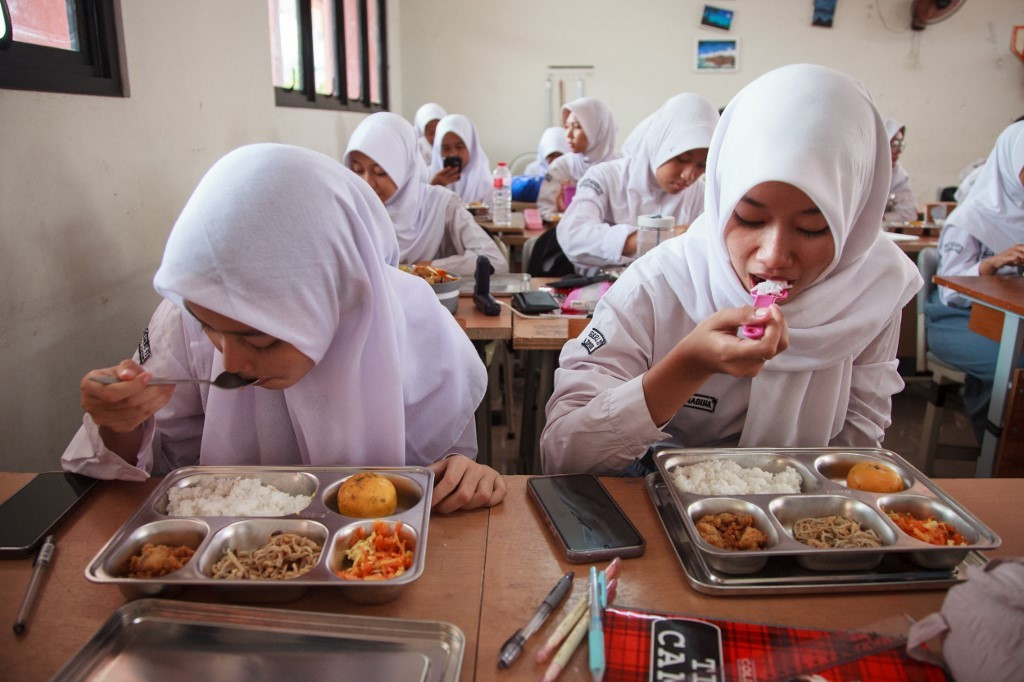Popular Reads
Top Results
Can't find what you're looking for?
View all search resultsPopular Reads
Top Results
Can't find what you're looking for?
View all search resultsAnalysis: Prabowo sees free nutritious meal program as glass half full
Change text size
Gift Premium Articles
to Anyone
P
resident Prabowo Subianto used his first state of the nation address on Aug. 15 to talk up his hugely ambitious free nutritious meal program, claiming success although so far it has reached less than a quarter of the 83 million targeted recipients since its January rollout.
The message is clear: He will continue with his signature policy despite serious challenges about its feasibility and sustainability that had prompted critics to call for scaling it back or at least scaling it down.
He is not deterred. The free meals program was one of his main promises made on his way to win the presidential election in 2024 as a way of fighting stunting, with Indonesia among the countries with highest prevalence despite its upper-middle-income classification by the World Bank.
Prabowo has even expanded the program, originally aimed at all school children, estimated at 82.9 million, to include pregnant women and children under-five. No one has put a final figure with this expansion, but even the original numberwas daunting.
He is putting money where his mouth is. In the budget speech later the same day, he announced an allocation of Rp 335 trillion (US$21 billion) for the program in 2026, five times the figure for this year and accounting for 9 percent of the government’s total spending of Rp 3,786 trillion next year.
Prabowo based his success claim on the report he had received just that morning from the National Nutrition Agency (BGN) which overseas the program that coverage had reached 20 million. This is contentious given that just two weeks earlier it said it had only covered 10 million.
He compared this progress with Brazil, which he said needed11 years to reach 40 million people.
“This is not just a social program. It provides the necessary foundation to build a generation of healthy, smart and productive people. The United Nations says it is the best investment any nation can make,” the President said.
He said school attendance had gone up since the program’s rollout with children performing better, without citing any specific study to back the claim. The BGN says its own studies of the program in several cities in West Java, North Sumatra and Papua found children more focused and learning better compared with when they went to school on empty stomachs.
There is also the economic impact, with Prabowo citing that the 5,800 kitchens set up for the program created 290,000 new jobs and benefited one million farmers, fishermen, cooperatives and micro, small and medium enterprises(MSMEs) that are involved with the policy.
The target is to have 32,000 kitchens nationwide with even greater multiplier impacts on the economy, particularly in villages.
Undermining this claim of the impact on local economies is that many of these common free meals program kitchens are entrusted to the police and the military and some big religious organizations.
Prabowo did not directly address critics of the program but said they should recognize progress rather than focusing on the shortcomings.
BGN chief Dadan Hindayana separately recognized the problems but dismissed them as normal for any new government program of this scale.
But critics say some issues may be fundamental.
Administering them on a scale is already a huge challenge, including controlling the quality, with now frequent reports of food poisoning affecting children and teachers in the program.
There is also the classic problem of embezzlement affecting government programs, with reports of contractors not getting payment, or being paid less than they are owed, and of favoritism in awarding the contracts.
Because of the sheer scale, the government has already reduced the amount spent per meal. From the initial minimum of Rp 15,000 to ensure nutritious content, it was brought down to Rp 10,000, and now even less, raising questions about whether it can still be called nutritious.
With the President determined to succeed, the program is already taking precedence over all other government spending, even on education.
The Finance Ministry said the fund allocation for the program will come from the 20 percent of total annual government spending on education as mandated by the constitution. This means other spending items on education, including improving teachers’ salaries and repairing school building and providing facilities, will have to be sacrificed.
A big part of the problem is the question of scale, and this is something that the President can easily fix if he is willing to back off from his determination to make the program universal for all children in all schools, whether government or privately run.
If he was impressed with Brazil during his trip there early this year, he should know that its National School Feeding Program covers only government-run schools, which covers 40 million students. India’s mid-day meal scheme is also provided for government and government-aided-schools and covers 120 million children. The United States National School Lunch Program is a federally assisted meal program for children from poor families.
Indonesia is emulating rich Sweden, with a population 11 million, in trying to make its free meals program available to all children irrespective of what school they go to or their parents’ income. Even a casual observation will tell you that more than half of Indonesia’s 83 million schoolchildren are already well fed, and do not really need government assistance. Likely, they are getting far better meals at home than the program can provide.
The free meals program will continue to be a story in the coming years as it has become Prabowo’s signature policy. And if he decides to run for a second term in 2029, as he is likely to, he will be judged by the success of this program. Then voters will be more critical of whatever figures he shows.
What we’ve heard
An official at BGN mentioned that the increase in the free lunch budget was driven by the target of reaching 82 million beneficiaries. With this year’s available budget, BGN has only been able to provide free nutritious meals to fewer than 10 million beneficiaries. “The funding need is around Rp 25 trillion per month,” said the source.
The budget for free lunch is categorized under the education sector because the government considers nutrition improvement to be part of improving education quality. According to the same source, the free nutritious meal program may reduce the budget for improving learning facilities and teaching staff.
The official added that BGN would use part of the additional funds for organizational development. “A digitalized system will be used to streamline kitchen coordination,” the source said.











